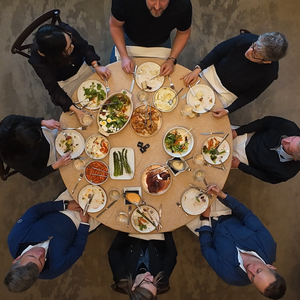Flagship Pioneering has conceived and grown more than 100 innovative companies by translating insights from the life sciences, chemical engineering, and computer sciences into unprecedented technology platforms. For example, Repertoire Immune Medicines can create novel medicines by decoding the immune system; Cygnal Therapeutics is unlocking new therapeutic areas such as exoneural biology; and Moderna has pioneered mRNA therapeutics so that cells can produce their own drugs. Moderna’s mRNA vaccine for COVID-19, which moved from sequence selection to human trials in a record-setting 63 days, is a testament to our unique methodology for creating first-in-category life sciences companies.
Flagship’s institutional process for systematic innovation also guides the scientist-entrepreneurs who create agriculture and sustainability companies. The same spirit of origination that Flagship employs to invent innovative therapeutics is used to develop ideas and technologies that will revolutionize agriculture and reduce its environmental impact.
All over the world, farmers must produce ever-increasing quantities of high-quality products on less land. At the same time, economic and environmental pressures require them to grow those crops with less water, nutrients, and crop-protection products such as insecticides and fungicides. Today, the most pressing challenge in agriculture is how to help growers cope with a changing environment, unpredictable pest outbreaks, climate change, population pressures, and past land mismanagement, all while protecting the planet for future generations.
Flagship Pioneering’s Green Team is a multidisciplinary group of scientists, inspired by Flagship’s therapeutics platform companies to develop a new generation of cost-effective products that have faster development times, greater efficacy, and a more benign environmental impact than traditional seeds, pesticides, and herbicides. We expect our innovations to deliver extraordinary returns to growers and society as a whole, redefining agricultural practices in the 21st century.
Innovations from outside agriculture
Seres Therapeutics was founded by Flagship in 2012 to revolutionize the treatment of a wide range of diseases by modulating the function of the human microbiome. One year later, we created Indigo Agriculture with the idea that microbes are as central to the health and development of plants as they are to human health. It turns out that microbes in plants can dramatically improve crop resilience to myriad stresses, including drought, heat, cold, bacteria, fungi, and insects, and also increase crop yields. The company then connects growers and buyers directly to bring these harvests to market.
A key to crop production is the germplasm of plants—their seeds. Both annual and perennial crops need to be able to cope with environmental change as well as existing and emerging biological pests. To solve these problems, we created Inari Agriculture in 2016, which uses precision genome editing along with the latest in molecular, computational, and germplasm delivery technologies to customize the best possible germplasm for growers. Inari’s technology was made possible by insights generated by human genome editing, which was itself suggested by how bacteria defend themselves from phage attack using the natural version of CRISPR. Inari combines gene editing and rapid seed development to offer better alternatives to slow, imprecise, traditional plant breeding methods or genetically modified organisms, which suffer from regulatory burdens and consumer resistance.









